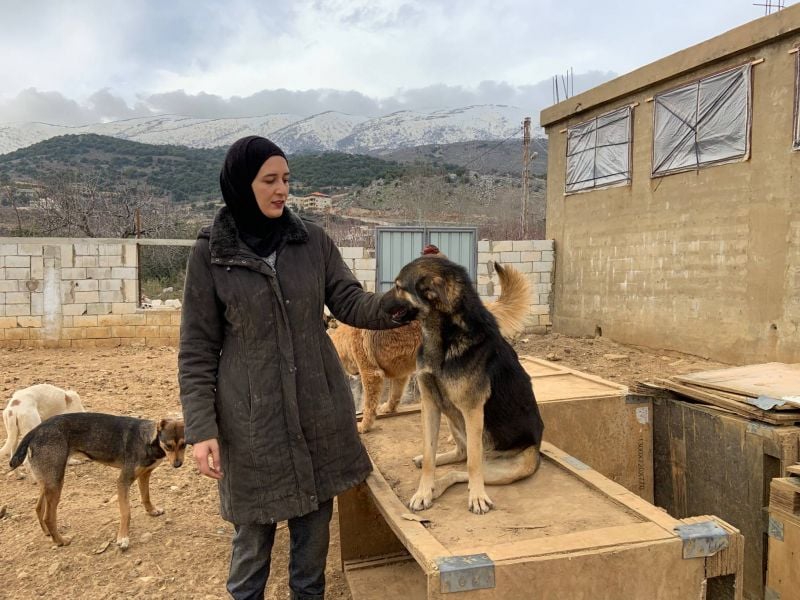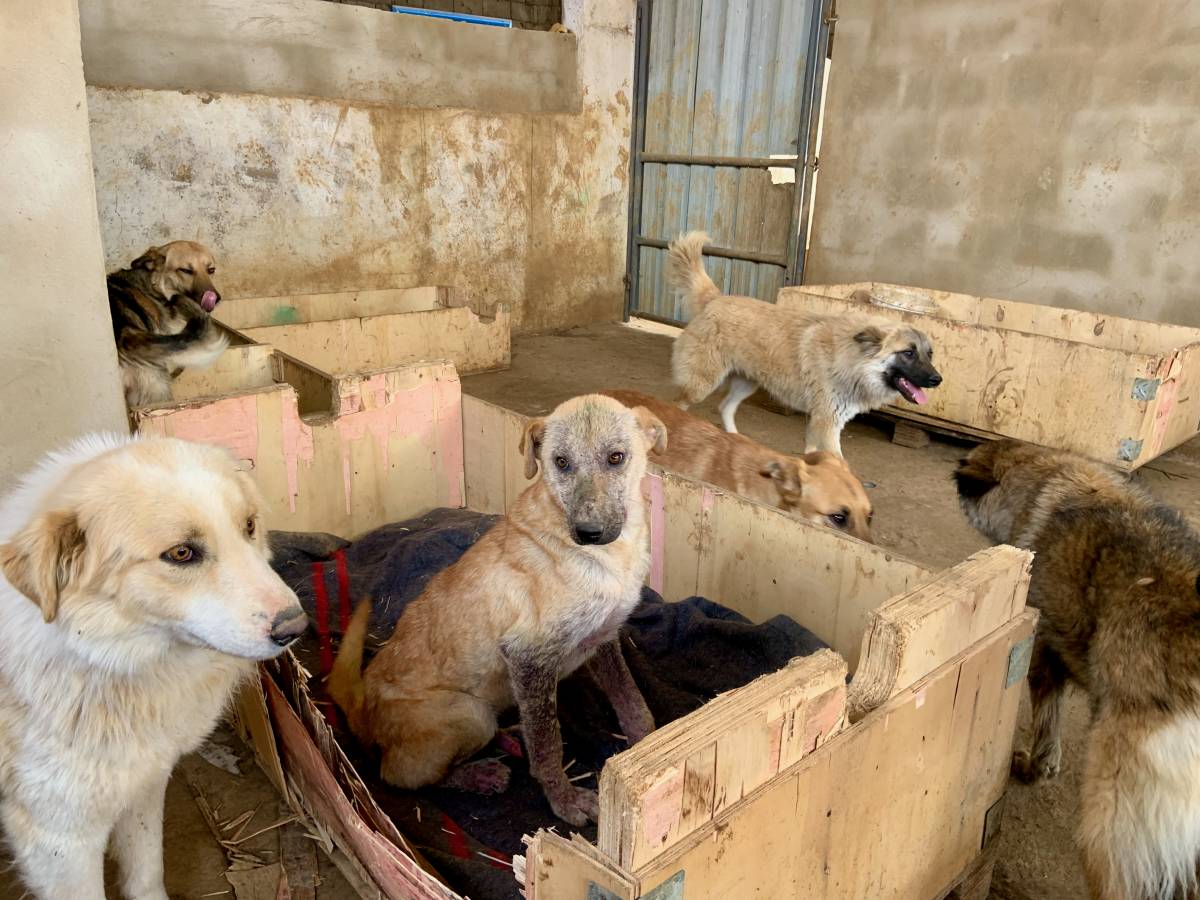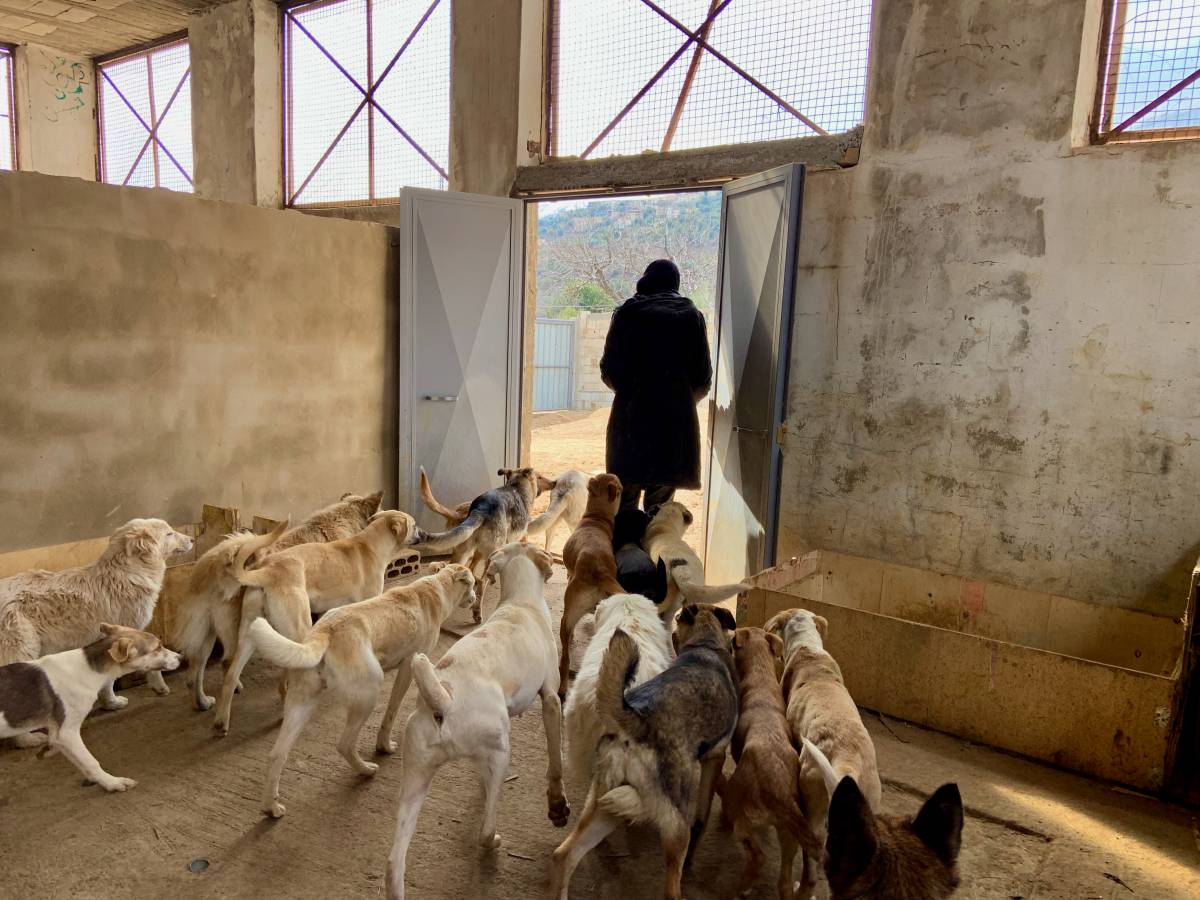
Rawaa Mady with Zara, a dog, at the Bekaa Rescue and Shelter in Ain Zebdeh, Feb. 22, 2022. (Credit: Richard Salame/L'Orient Today)
AIN ZEBDEH, Bekaa — It was nearly a year into Lebanon’s economic crisis when Rawaa Mady received a message on social media asking if she could help a wounded dog in Zahle. The animal had been shot in the leg.
The 28-year-old teacher wasn’t a full-blown rescuer but was active in local animal rescue social media groups, and a couple of months prior she had rescued a kitten and some puppies. Mady recalls that she was “a bit scared” because the dog was big and she still wasn’t very used to handling canines, but she went to Zahle anyways and picked him up and, after a trip to the vet, began nursing him back to health.
Since that day, she has quickly become one of the region’s go-to people when a wounded or sick dog is sighted.
Forty-five minutes south of Zahle, the southern Bekaa’s only dog shelter, Bekaa Rescue and Shelter, is a small building nestled in the midst of agricultural land east of Ain Zebdeh. There, nearly 70 dogs of different sizes and breeds live, heal, and await a chance at adoption in Lebanon or overseas.
Some of the dogs bear the scars of mistreatment — bullet wounds, amputations, and severed ears. Others have no physical marks of their traumatic pasts but, Rawaa says, are survivors of starvation, poisoning, and exposure to the elements.
Walking through the enclosures where the dogs live, Mady points them out one by one, giving their names and their stories as the canines jump on their hind legs to get her attention.
There’s Chaplin, who miraculously survived being shot in the head. There’s Bingo, who was beaten with metal rods and came to the shelter with a broken leg. There’s a German shepherd who is going to be resettled in Germany, and little baby Rico, destined for Switzerland. He is the only survivor of a poisoning that took the rest of his family.
“Every time there’s a case in Bekaa, they tell me,” Mady said.
As if to prove her point, a neighbor dropped by to tell her he had seen two stray dogs in a nearby village and he wanted to know if she would take them in. She told him to reach out to Tamer. He is the shelter’s landlord and helps around the shelter “a lot,” according to Mady. She can’t take every stray dog, she said, focusing on the wounded, sick and young.
 Hero, a dog who suffers from mange, at the Bekaa Rescue and Shelter in Ain Zebdeh, Feb. 22, 2022. (Credit: Richard Salame/L'Orient Today)
Hero, a dog who suffers from mange, at the Bekaa Rescue and Shelter in Ain Zebdeh, Feb. 22, 2022. (Credit: Richard Salame/L'Orient Today)
Many people in Lebanon are afraid of stray dogs, which can often be seen roaming the streets, especially in rural areas, in search of food. According to multiple animal welfare experts, in both cities and the countryside dogs are frequently shot, out of fear, malice or ignorance. They are also frequently poisoned with the insecticide Lannate, which subjects them to an excruciating death.
Lebanon passed its first animal welfare law in 2017, which established penalties of up to two years in prison and a fine of up to LL50 million for animal abuse, but it is not clear how effectively it has been enforced.
Milad Abou Jreile, who has been operating a shelter, Milo AR, in Zahle since 2009, said that fear and dislike of dogs is especially widespread in the Bekaa region.
In some cases, dogs are killed by farmers trying to protect livestock like chickens on which they depend. But, Abou Jreile argues, those farmers ought to be securing their chickens in coops to stop dogs from entering rather than shooting them.
A growing rescue operation
After rescuing her first dog, Mady found herself bringing more and more wounded dogs home. When keeping them at home became impossible to manage, she found some land she could use.
Outgrowing that plot, too, she rented the former cattle farm where the shelter is currently located last August. At first, she paid all these expenses out of her salary working with a local NGO that brings technology like tablets to refugee schools, but as the number of dogs grew she turned to donations, fundraising on social media.
Mady is well positioned to be an ambassador spreading the message not to fear or hate dogs. She didn’t grow up with dogs and was also scared of them when she was younger, she said, but that sentiment changed as she grew older, and especially when her brother got a puppy.
“I just couldn’t understand how people can be so cruel,” Mady said of the animal abuse cases she has witnessed. “I started telling myself, if I’m not gonna do it in Bekaa, few people would, or maybe nobody would pick up a sick animal hit by a car or shot. It started from there — I couldn’t leave them.”
The economic crisis has, if anything, increased the need to protect Lebanon’s dogs.
“The dogs are the first to pay the price of the economic crisis because they are [seen as] commodities. They are not part of the family in most of the homes in Lebanon,” says Helena Hesayne, vice president of Beirut for the Ethical Treatment of Animals, which operates the country’s largest animal shelter, with more than 1,000 animals. “We’ve been seeing so many, even pure breeds, on the streets of Lebanon that are young, old, small, big, without any difference, dumped on the road.”
Abou Jreile, who currently houses some 140 dogs between his shelter and his home, agreed that dumping of dogs has reached levels he’s never seen before.
With the increase in dumping, many of today’s new strays are freshly on the street after living with humans in homes. These dogs might approach humans for help, Hesayne says, which puts them at risk of being attacked by those humans out of fear.
After two years of crisis, she said rescuers are seeing “a lot of abuse, a lot of abuse that we’ve never seen before.”

Caring for dozens of dogs, some of whom need veterinary care, is expensive. For food alone, each one of Mady’s dogs needs 500–600 grams of dry food per day, she said. Collectively, that’s more than a ton of dog food per month. All the dogs are spayed, neutered, and vaccinated; some may need medications and surgeries. For some advanced surgeries, Mady receives help from another NGO, Adopt Don’t Shop.
She also uses social media to connect with international adopters, who must pay for the travel preparations and transportation. About half a dozen dogs are currently slated to go overseas.
Mady’s dogs won’t be euthanized, no matter how long they go without finding an adoptive home, the only exception being humanitarian euthanasia for dogs whose wounds mean the only alternative is a life of suffering. Broken spines are particularly difficult to recover from.
With Lebanon scraping along in the depths of a devastating economic crisis, Mady said she frequently gets asked why she should take care of dogs, particularly since the Bekaa region has higher rates of poverty and a larger population of refugees than many other areas in Lebanon.
“People tell me, ‘Oh, you should be helping humans and not animals,’” Rawaa says. “In Bekaa and all over Lebanon there are lots of NGOs… It’s fine if one person cares for animals. This is what I tell them. Just because we help animals doesn’t mean we don’t help humans, but no one looks after [the animals].”